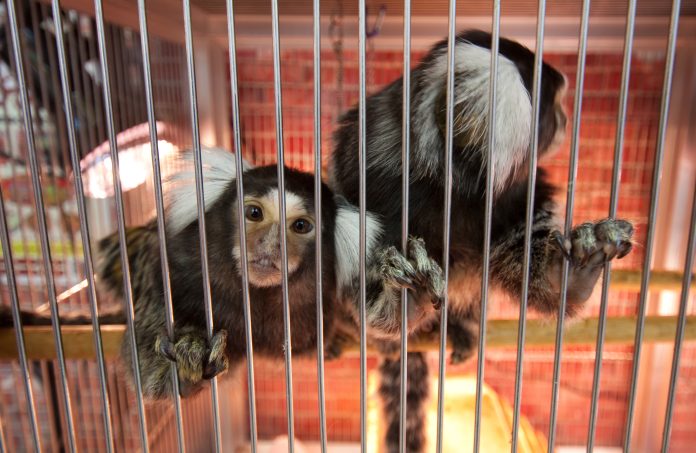In our increasingly fragile world, protecting wild populations and their habitats is a significant challenge. Open Access Government examines the impact of the pet primate trade on animal welfare and the security of their natural environments
We’re accustomed to seeing primates in the wild; however, in recent decades, these highly intelligent animals have been increasingly featured in social media content for the purpose of entertainment, which has, in turn, driven the demand for primates as pets. According to animal welfare charity Born Free, an estimated 5,000 primates are being kept as pets in the UK alone. This includes species like marmosets, capuchins, squirrel monkeys and lemurs. Figures for the US suggest around 15,000 primates are kept as pets in domestic settings. (1)
In the wild, primates are used to living in social groups to survive, yet as pets, they are often isolated and kept in conditions which are completely disconnected from their natural environments. As a result, primates can suffer physical and psychological distress. Asia for Animals’ Social Media Animal Cruelty Coalition (SMACC) conducted an investigation into the emerging trend of keeping macaques as pets. Between September 2021 and March 2023, SMACC identified 1,226 instances of content links from Facebook, Instagram, TikTok, and YouTube, featuring these animals being kept as pets. The content ranged from seemingly ‘innocent’ treatment of the animals to violence and torture. What’s more they found that 13% of the content featured deliberate psychological torture where macaques were intentionally made to feel fear and distress. Sixty per cent of the links showed pet macaques being directly physically abused. Collectively, at the time of analysis, the links had been viewed 12,054,378,907 times. (2)
World Animal Protection’s Global Head of Wildlife Research, Dr Neil D’Cruze, commented: “Some of the content shared on social media is incredibly hard to watch. Let’s be clear, this is not entertainment, for ‘likes’ and ‘shares’, this is animal abuse…
“Social media platforms are normalising the cruel treatment of macaques by allowing these videos to remain on their platforms. They have a responsibility to shut down these content creators and send a message that animal cruelty is not to be tolerated. These platforms need to proactively step up and take action to stop animal cruelty content being uploaded in the first place.
“If you see this type of content – report it, do not engage with it. We all have a role to play.”
The key risks and challenges that primates face when being kept as pets
Animal welfare groups such as the RSPCA and Wild Futures reportedly receive approximately one call a week concerning the welfare of a captive monkey. Many primates end up in sanctuaries, and even for those that are returned to the wild, their chances of survival are low. Primates can live up to 20 or even 40 years and require specialised care. They possess intricate biological systems, including hormonal signalling via olfactory cues (touch and scent), to maintain their strong social bonds and reduce stress. (3)
Infants can be taken away from their parents at a very young age in order to be sold into the pet trade. This can lead to stress and behavioural issues, such as rocking, pacing, or becoming aggressive towards owners. Some behaviours exhibited by macaques, such as smiling, may be misinterpreted as positive when, in fact, the animal is in distress. Nutritional deficiencies are also common in pet primates, with many of them developing diabetes due to unsuitable diets.
The pet primate trade and wildlife conservation
The trade of primates as pets is putting the survival of many wild species at risk. Many primates are removed illegally from their families and sold illegally; their parents may also be killed so infants can be caught. Additionally, primates may not survive their journey to buyers due to stress and disease. According to the International Union for Conservation of Nature, 464 out of the 719 primate species and sub-species currently recognised are threatened or endangered due to habitat loss, hunting, and live capture. Sixteen per cent (117) are classified as Critically Endangered. In equatorial Africa, Asia, and Latin America, a combination of deforestation, habitat conversion, poaching for bushmeat and live trade, as well as the spread of diseases from animals to humans, has led to an almost 50% decline in the 630 recognised species and sub-species of primates. If these threats are not addressed, many wild primate species are at risk of extinction. Because primates play a crucial role as keystone species in their habitats, their diminishing numbers could have significant ecological impacts. (4)
Policy changes to tackle the pet primate trade
Earlier this year, the UK Government introduced new legislation regarding the keeping of primates as pets. The new rules state that it will be illegal to keep monkeys, lemurs, and other primates without a licence starting from April 2026. All private primate keepers will be required to hold a licence issued by their local authority. Failure to comply with licence conditions could result in an unlimited fine or removal of the primate. Those who own a primate without the appropriate licence could face six months in jail, an unlimited fine, or both. Critics have argued that this does not equate to an outright ban on keeping pet primates, as was promised in the Conservative Party’s 2019 manifesto.
In the US, Earl Blumenauer, Brian Fitzpatrick and Senator Richard Blumenthal introduced the Captive Primate Safety Act. This bipartisan legislation is a critical solution to the pet primate trade as it would ban the private possession of primates in the US. While more than 30 states already prohibit private ownership of primates, they can still be easily obtained through out-of-state dealers, auctions, and the Internet, making a federal law necessary to support state efforts.
Senator Richard Blumenthal said: “This measure protects both primates and people. Wild animals belong in the wild, not shackled and mistreated in someone’s backyard. Humans often are injured by wild animals kept as pets because their deeply ingrained instincts resist domestication, causing them to be dangerously unpredictable pets. The Captive Primate Safety Act is about safety, but also basic humane behaviour – ending the exploitation of these human-like, highly intelligent, social animals.” (5)
References
- https://earth.org/born-free-usa-applauds-introduction-of-captive-primate-safety-act/
- https://www.worldanimalprotection.org/latest/press-releases/cruelty-you-dont-see-suffering-pet-macaques-social-media-content/
- https://primate.wisc.edu/primate-info-net/pin-factsheets/pin-factsheet-primates-as-pets/
- https://www.gov.uk/government/news/keeping-primates-as-pets-banned
- https://www.blumenthal.senate.gov/newsroom/press/release/blumenthal-blumenauer-and-fitzpatrick-introduce-bipartisan-bicameral-legislation-to-ban-private-possession-of-primates











